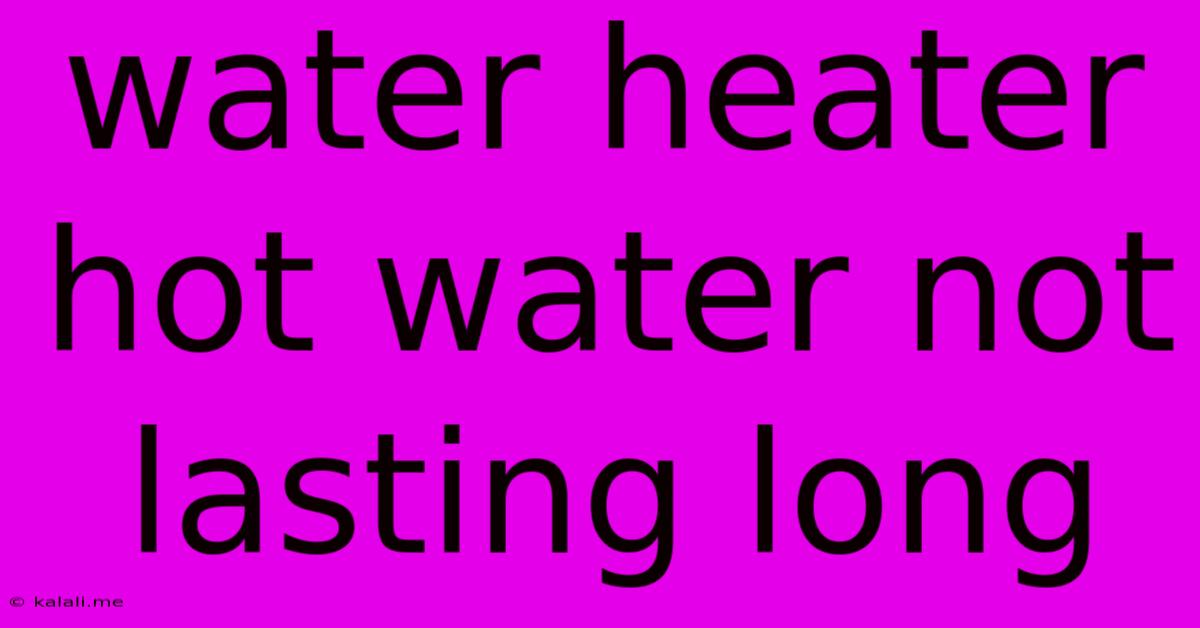Water Heater Hot Water Not Lasting Long
Kalali
May 23, 2025 · 3 min read

Table of Contents
Why Isn't My Hot Water Lasting Long? Troubleshooting Your Water Heater Woes
Is your hot water vanishing faster than a magician's rabbit? Frustrating, right? Running out of hot water before you've finished your shower or a load of laundry is a common problem with a variety of potential causes. This guide will help you diagnose the issue and find solutions, saving you time, money, and frustration.
Common Causes of Short-Lived Hot Water:
Several factors can contribute to your hot water disappearing prematurely. Let's explore the most frequent culprits:
1. Low Water Heater Capacity: The Size Matters
Your water heater's capacity, measured in gallons, directly impacts how much hot water you have available. A smaller tank simply holds less hot water. If your household has grown, or you've added water-intensive appliances (like a larger washing machine), your existing water heater might be too small to meet the demand. Consider upgrading to a larger capacity tank if this is the case. This is especially relevant for large families or homes with multiple bathrooms.
2. Sediment Buildup: The Silent Thief of Hot Water
Over time, sediment (mineral deposits) accumulates at the bottom of your water heater tank. This sediment acts as insulation, reducing the efficiency of heat transfer and wasting energy. The result? Your water heats more slowly, and your hot water runs out sooner. Regularly flushing your water heater will remove this sediment and restore its efficiency. This is a relatively simple DIY task, and instructions are easily found online.
3. Leaking Water Heater: A Hidden Drain
A slow leak in your water heater tank can lead to a gradual depletion of hot water. Check regularly for signs of leaks around the base of the tank, pipes, and fittings. A small drip can add up over time, significantly reducing your available hot water. A persistent leak requires professional repair or replacement.
4. Faulty Thermostat: The Temperature Controller
The thermostat regulates the water temperature in your tank. If it's malfunctioning, it may not heat the water to the desired temperature, leading to a seemingly quicker depletion of hot water. A faulty thermostat might need to be replaced, which is another task best left to a qualified plumber. Consider the impact on your energy bills too; incorrect temperature settings can lead to unnecessary energy consumption.
5. Improper Insulation: Heat Loss
Poor insulation around your water heater allows heat to escape, resulting in faster hot water depletion. Make sure the insulation around your tank is adequate and in good condition. Adding extra insulation can improve efficiency. Consider the location of the tank too; a hot, poorly-ventilated area will lead to increased heat loss.
6. Excessive Water Usage: Demand Overload
Are you suddenly using significantly more hot water than usual? Consider adding up the water usage of your appliances and family routines. A new family member, longer showers, frequent laundry, or a dishwasher running more often can easily deplete your hot water supply. Try to become more conscious of water conservation techniques to minimize this.
7. Age of the Water Heater: Time for an Upgrade?
If your water heater is quite old (typically 8-12 years for conventional models), it may simply be reaching the end of its lifespan. Older units become less efficient over time and can lead to frequent hot water shortages. Consider replacing it with a new, energy-efficient model.
Troubleshooting Steps:
- Check for leaks: Inspect the entire water heater for any visible leaks.
- Check the thermostat setting: Ensure the temperature is set appropriately.
- Flush the tank: Remove sediment buildup to improve efficiency.
- Inspect the insulation: Ensure adequate insulation around the tank.
- Assess water usage: Monitor your household's hot water consumption.
- Consider the age of the unit: A very old water heater might need replacing.
By systematically addressing these points, you should be well on your way to solving your hot water woes and enjoying long, satisfying showers once again. If the problem persists after trying these solutions, it's advisable to contact a qualified plumber for professional assistance.
Latest Posts
Latest Posts
-
Ender 3 Pro Media Init Fail
May 23, 2025
-
How Long Between Coats Of Polyurethane
May 23, 2025
-
Stalker Soc Brain Scorcher Door Codes
May 23, 2025
-
How To Recover A File After Rm
May 23, 2025
-
How Much In One Box Of Powdered Sugar
May 23, 2025
Related Post
Thank you for visiting our website which covers about Water Heater Hot Water Not Lasting Long . We hope the information provided has been useful to you. Feel free to contact us if you have any questions or need further assistance. See you next time and don't miss to bookmark.